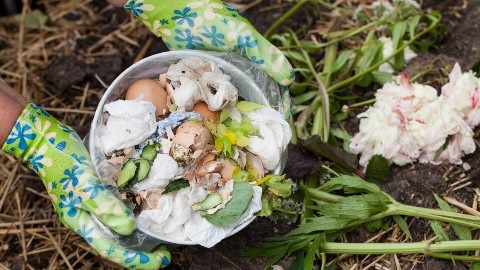Going Green As We FOGO and Grow
Published 04 July 2022

If you’ve never heard the term ‘FOGO’ before, strap in for a serious conversation about how we manage ‘Food Organics and Garden Organics’ in Moreton Bay.
This year’s Budget has officially ‘commenced the countdown’ to the new kerbside service - which is expected to start late 2025 - and Mayor Peter Flannery says unlike other Councils in Queensland, Moreton Bay is skipping the trial phase.
“We’re commencing planning and designs this financial year with $400,000 dedicated to doing that work ahead of construction on Moreton Bay’s very own Food Organic and Garden Organic (FOGO) waste collection service,” he said.
“Between 50 to 58 per cent of waste currently being disposed into landfill was being generated from residential sources and food waste is the largest waste type disposed by households - equating to around 100,000 tonnes going to landfill each year!
“There is a huge opportunity for council and the community to join forces and ensure this resource is put to a better use by transforming it into options such as energy, biofuel or quality compost and we know we need to do better.
“Moreton Bay is no different to many other local government areas, with more than half of the volume of our general waste bins comprising garden or food waste.
“So there’s a heap of work ahead of us to get this new collection and recycling project up and running, but our goal is to be among the first local governments in Queensland to introduce a full-scale FOGO service for all our residents.
“Locals have long called for green bins and this Council is proud to be stepping up to the challenge of managing waste more sustainably, as part of our mantra to ‘Go Green As We Grow’.
“We’ll be working closely with the Council of Mayors SEQ and Queensland and Australian governments to make it a reality.
“Diverting and repurposing organic material is both a national and state waste management priority, and we will be counting on their support as partners on this journey.”
Mayor Flannery said $400,000 had been allocated in 2022/23 to plan and commence detailed design work before construction of a dedicated food and garden waste recycling facility gets underway in 2024-25.
“This marks an exciting new stage in our sustainability story - and the biggest innovation in Moreton Bay’s waste services since kerbside recycling services were introduced some 30 years ago,” Mayor Flannery said.
“The collective action we take in this space will become even more significant and valuable over time, given around 10,000 new Moreton Bay residents are arriving each year to enjoy all our area has to offer.
“This is a perfect example of how your Council is committed to ‘Going Green As We Grow’.
“A business case for the FOGO service is now underway and we will be looking to share more information with communities later this year.”
Mayor Flannery said although the new kerbside FOGO service would make it easy for residents to recycle their green waste and food waste, there were things we can do right now to harness the value and benefits of organic waste at home.
“Rather than placing garden clippings and vegetable scraps in the landfill bin, starting a home compost project allows this valuable material to live a new life on garden beds or around the yard,” Mayor Flannery said.
“There are plenty of helpful hints to get you started on Council’s website.”
Mayor Flannery said Council was already investing in waste-to-energy technology at its landfill sites.
“Council has partnered with LGI to capture methane gas produced by landfills to create renewable energy,” Mayor Flannery said.
“Dakabin, Bunya and Caboolture waste facilities all have landfill gas to energy plants in place and together they generate enough energy to power up to 7,000 average homes.”
Earlier this year Council also announced Moreton Bay would become the first local government in Australia to install a Tesla Megapack battery at its Bunya Waste Management Facility to help harness green energy created from converting landfill gas emissions.
“This storage capability will allow power to be exported more efficiently during high demand periods when people are home in the evening and other sources of renewable energy like solar are less available,” Mayor Flannery said.
“If it meets expectations, similar battery packs will be installed at the Caboolture and Dakabin waste facilities.”
Council is also boosting its green credentials with changes to its waste policy, cracking down on those who take advantage of the free service by dumping more than their fair share.
From tomorrow (July 1 2022) free waste disposal of General Waste, Green Waste, Clean Concrete and Clean Soil will be capped at three tonnes per year, or 26 visits per financial year (whichever is reached first).
Mayor Peter Flannery said these changes will only affect a very small percentage of waste facility users.
“Only 2.6 per cent of waste facilities users disposed of more than 3 tonnes of products in the 2020-21 financial year and just 1.7 per cent of people visited more than 26 times,” he said.
“Household waste generation, including kerbside wheelie bin collections, sits at 600kg per person per year.
“These little changes will have a positive impact on the bigger picture, which is critical to our goal of ‘going green as we grow’ in the face of a booming population.
“We are working really hard to encourage our community to divert as much waste as we can away from landfill, through our Rethink Waste program.
“Choosing to reduce, reuse and recycle, avoiding disposing unwanted materials in general waste bins, and thinking beyond the recycling bin, is just the start.
“Council is committed to our 10-year Waste Reduction and Recycling Plan, managing waste in an innovative and cost-effective way.
“By cutting down on waste, reducing our carbon footprint, and pulling back on the amount of rubbish going into landfill, we are working towards a more sustainable future for Moreton Bay.”
Find out more information.